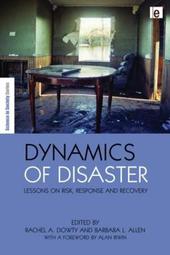
|
Dynamics of Disaster: Lessons on Risk, Response and Recovery
Hardback
Main Details
| Title |
Dynamics of Disaster: Lessons on Risk, Response and Recovery
|
| Authors and Contributors |
By (author) Rachel A. Dowty
|
|
Edited by Barbara L Allen
|
|
Edited by Rachel A. Dowty
|
|
Foreword by Alan Irwin
|
| Series | The Earthscan Science in Society Series |
|---|
| Physical Properties |
| Format:Hardback | | Pages:240 | | Dimensions(mm): Height 234,Width 156 |
|
| ISBN/Barcode |
9781849711432
|
| Classifications | Dewey:363.34 |
|---|
| Audience | | General | | Tertiary Education (US: College) | |
|---|
| Illustrations |
Photos, maps, figures, index
|
|
Publishing Details |
| Publisher |
Taylor & Francis Ltd
|
| Imprint |
Earthscan Ltd
|
| Publication Date |
22 April 2011 |
| Publication Country |
United Kingdom
|
Description
Disasters are the result of complex interactions between social and natural forces, acting at multiple scales from the individual and community to the organisational, national and international level. Effective disaster planning, response and recovery require an understanding of these interacting forces, and the role of power, knowledge and organizations. This book sheds new light on these dynamics, and gives disaster scholars and practitioners new and valuable lessons for management and planning in practice. The authors draw on methods across the social sciences to examine disaster response and recovery as viewed by those in positions of authority and the 'recipients' of operations. These first two sections examine cases from Hurricane Katrina, while the third part compares this to other international disasters to draw out general lessons and practical applications for disaster planning in any context. The authors also offer guidance for shaping institutional structures to better meet the needs of communities and residents.
Author Biography
Rachel A. Dowty is an assistant professor at Louisiana State University's (LSU's) Department of Geography and Anthropology and Co-Director of LSU's Disaster Science and Management (DSM) Program in the School of Humanities and Social Sciences. She received her Ph.D. from Rensselaer Polytechnic Institute in the field of Science and Technology Studies (STS), studying how culture shapes scientific and technological standards for rational decision making. She developed low-impact methods for response to oil spill crises in Louisiana marshlands while earning her M.S. in wetlands ecology. Prior to receiving her PhD in STS, she served as a faculty member of biological sciences and environmental sciences at Southeastern Louisiana University, the State University of New York (SUNY) at Plattsburgh and at Clinton Community College. Barbara L. Allen is an associate professor and the director of the graduate program in Science, Technology and Society (STS) at Virginia Tech's Washington DC area campus where she also teaches the sociology of risk, sociology of knowledge, and public participation in science and technology. Her previous degrees were in Civil Engineering (B.S.) and Architectural Technology (M.S.) and prior to receiving her PhD in STS in 1999 from Rensselaer Polytechnic Institute, she was a professor of architecture at both the University of Louisiana at Lafayette and Tulane University. She is author of Uneasy Alchemy: Citizens and Experts in Louisiana's Chemical Corridor Disputes and is completing another book on citizen participation in environmental struggles leading to policy changes in Europe and the U.S.
Reviews'As the first book to bring a Science and Technology Studies perspective to disaster studies, The Dynamics of Disaster shows how disaster planning and remediation can benefit from attention to issues such as local knowledge, uncertainty, undone science, and knowledge gaps. In addition to the book's importance to the social sciences, it also brings valuable and practical policy insights into the problem of how to design sociotechnical systems that are both more resilient and more just.' Professor David J. Hess, Science and Technology Studies Rensselaer Polytechnic Institute 'Hurricane Katrina raised far more questions than answers about natural disasters. How are disasters 'political'? How are disasters shaped by the natural environment as they shape it? What does culture mean for disaster vulnerability and resilience? Dynamics of Disaster is an outstanding collection of essays by senior researchers and bright and energetic young scholars, who come together here to answer these questions, and more. This book places Katrina, and the idea of disaster, in a global context, and draws on a wide range of disciplines and approaches. It is a must-read book for those interested in cutting-edge research on disasters.' Thomas A. Birkland, William T. Kretzer Professor of Public Policy, North Carolina State University 'Disasters are often blamed on the whims of nature, but we rest in such simplistic explanations at our peril. As the essays in this volume make clear, even disasters widely perceived as 'natural' typically implicate human artifacts, organizations, technologies, and choices. Building on research in Science and Technology Studies and other social science fields, the authors show how disasters are embedded in, and shaped by, the societies in which they unfold. Dynamics of Disaster should be required reading not only for disaster managers but also for urban planners, engineers, and others engaged in designing the built environment and managing technological systems.' Stephen Hilgartner, Department of Science & Technology Studies, Cornell University
|